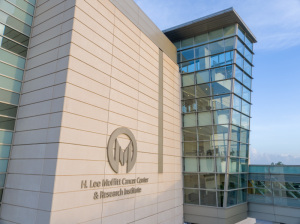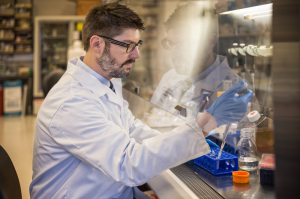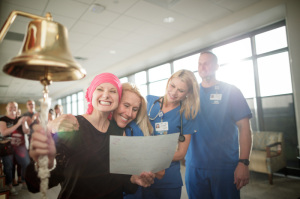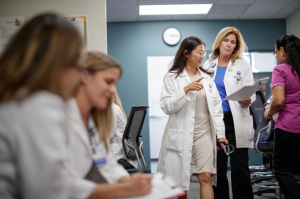Q&A with Jack Kolosky, Executive VP and COO of Moffitt Cancer Center
July 06, 2018
by Sean Ruck, Contributing Editor
For this month’s installment of Hospital Spotlight, HCB News spoke with Moffitt Cancer Center’s Jack Kolosky to learn about some of the challenges a Florida-based cancer center faces, and to hear about some of the innovations they’re helping to pioneer.
HCB News: How long have you been with Moffitt?
Jack Kolosky: It’s going on 19 years. I started at Moffitt in 1999.
HCB News: What drew you to a career in healthcare?
JK: The things I enjoyed about healthcare were the interaction with the doctors and staff. I started off as an auditor and became a healthcare financial analyst. I always found finance to be a good way to have a good overall view of the organization and its direction. I came to Moffitt as the CFO, a role I served in for several years. The CFO was typically part of board discussions and strategic discussions. I enjoyed that part of it. I became the COO about 10 years ago and hospital president.
HCB News: What attracts staff to Moffitt?
JK: From my point of view, if you’re in cancer care, you’re part of the work that tackles a disease that has touched most families in one way or another. If you care about it, then you want to be at a first-class organization that’s working on the latest breakthroughs. Moffitt is a relatively younger organization, going on 32 years old, but I think that it’s got a very progressive spirit. One of the things I find that marks Moffitt as distinctive is its attention to teams and teamwork. The clinical programs are organized into multi-disciplinary teams based on disease sites. So that could be a medical oncologist, surgeon, radiation oncologist, the pathologist, the radiologist, all who work on a particular disease – let’s say lung cancer, for example – are all within that program and all working on the best diagnosis of the patient and the best treatment plan for that patient, including offering the latest therapies like clinical trials.
HCB News: As a cancer center, do you attract patients from other states? What’s the breakdown of in-state versus out of state?
JK: Florida is a pretty big population to draw from, but we do attract patients from out of state. About 2 percent of our patients come from outside of the U.S. As far as outside of the state, that’s a little harder to say because people who live in New York for five months of the year might live here seven, but still identify as New Yorkers. I’ll guess about 20 percent of our patients are from out of state in one way or another.
HCB News: Has the shift from fee-for-service to value-based care impacted Moffitt?
JK: Let’s start with our strategic plan. I think we could have tried to fight the shift to value-based care or we could try to embrace it. We think that Moffitt provides high value in the sense of the best outcomes and we think that our care model delivers that care at a competitive cost. So we think we should actually lean in to value-based care.
We’ve tried to do that through various partnerships with some of the payor community. We’ve embarked on experimental programs, the first with Florida Blue. We’ve since worked on other programs that target the cost of care with various quality outcomes. We’ve done those with Aetna and United Healthcare and we’re in discussion with several others. We’ve been able to demonstrate our value to those plans as well as helping them think through how they might do some of these programs elsewhere.
I’d also like to note our Pathways program. Our Pathways program is based on multidisciplinary care. We believe it delivers the quality of care with better outcomes at a competitive cost relative to the rest of the market.
HCB News: Is there a particular challenge with outcome-based care for a cancer center?
JK: One of the ways we try to manage outcomes is by stratifying risk based on the patient condition when they present to us. That’s indicated by the stage of their cancer and therefore, what treatments might come of that. I think the quality indicators that many of these programs are looking for, quite frankly, they come to us to find them.
One challenge I’d note is that we’ve talked to some of our pharmaceutical colleagues about joining with us. The idea is if a drug doesn’t show a response, could we get credit or something along those lines. To date there hasn’t really been a response from the pharmaceutical companies. I think that’s a frontier that still needs to be explored.
HCB News: With the migratory nature of many of your patients, is there a lot of effort in telehealth?
JK: We feel strongly regardless of where our patients are that they’re getting the right care at the right place at the right time. So the idea that we’ll transition care, whether chemotherapy or radiation or follow-up, is just something we do. However, it’s not so much yet with telehealth, although we have done some pilot programs with consultations for patients who are distant for follow-up. It’s been well-received, but not something we do much of at this time.
HCB News: Are there any big projects in the works that you can share with our readers?
JK: There’s CAR T therapy (Chimeric Antigen Receptor T), where a patient’s blood cells are extracted and re-engineered, and reinfused, so that those cells attack the cancer cells in the patient. There’s also immunotherapies that have amazing promise for substantial breakthroughs for patients.
We’re also in the final stages of working through our strategic plan. We’ll continue to serve more patients, continue to emphasize personalized medicine through better molecular profiling, to get the treatments exactly right, and I think we’ll continue to advance our digital work – remote monitoring and things along those lines.
HCB News: With the aging baby boomer population and Florida being a popular retirement destination, is there a challenge to staff up?
JK: In terms of physicians, there are not enough projected medical oncologists to serve all the patients who might be in need – this isn’t just in Moffitt, but across the state and across the country. Part of it is what people go into for training, part of it is the growing need from the baby boomers. Cancer is more likely to be a disease for the elderly, so it will continue to be a challenge. Like other health professionals, we have our challenges, but not as much as other facilities might have in nursing or pharmacy for example.
HCB News: What are the biggest challenges facing your facility today?
JK: Probably every hospital administrator would talk about declining reimbursement. While I don’t disagree, you have to keep in mind where our income goes. It’s plowed back into research and that’s what our challenge is. Our ability to continue to fund research and therefore breakthroughs that will make a difference in people’s lives, I think is challenged by reduced reimbursement. I think we’ve so far been up to the challenge, but it becomes more difficult every year. We want to see more fundraising, more industry partnerships, things along those lines, but it’s an ever-increasing challenge that I worry about.
HCB News: Is part of the funding problem due to smaller, incremental improvements that new technologies bring rather than the enormous strides from say, the introduction of MR decades back?
JK: I don’t think so. I’ll give you a good example, the CAR-T therapy I mentioned earlier; we’re very proud of it and is a great breakthrough, but it’s tremendously expensive. Drug companies have priced it at a very, very high level. It’s I think $470k for one therapy and $375k for another. That’s just the cost for that therapy and that doesn’t count the cost of hospitalization and follow-ups and all the other stuff. The criticism is that they’re recovering all of their costs off the patients and it doesn’t bear any relation to the cost of producing the drug for the patient. The fact is, what they would also say is that the cost to take any drug or therapy to market, with all the testing and reviews that need to happen, it’s a billion dollar expense and even then, there are cases where it doesn’t ultimately go to market. The time frame and cost it takes to bring a drug to market all have to be kept in mind. And then there’s a relatively narrow pipeline for those drugs. So that’s their challenge and it’s then part of our challenge.
Moffitt Cancer Center
Location: Tampa, Florida
Year founded: 1986
Number of beds: 206
Number of employees: 6,000
President: Dr. Alan List, president and CEO
Noteworthy distinctions
• Only National Cancer Institute-designated Comprehensive Cancer Center in Florida
• Listed in U.S. News & World Report as one of the “Best Hospitals” for cancer care since 1999
• Nursing staff is recognized by the American Nurses Credentialing Center with Magnet® status
• No. 4 on DiversityInc’s Top Hospitals and Health Systems list
• Working Mother Magazine’s 100 Best Companies
• Recognized as one of Tampa Bay Times “Top Workplaces” for eight years
• Top 10 Nonprofit Companies for Executive Women
• Recognized as a Human Rights Campaign Foundation LGBTQ Healthcare Equality Leader seven years in a row
• Earned the 2017 Leading Disability Employer Seal from National Organization of Disability
• One of the 100 Best Places to Work in IT By Computerworld
• CEO Cancer Gold Standard reaccreditation in 2017 for the 10th year
• Named a 2017 Business of Pride and 2017 Nonprofit of the Year by the Tampa Bay Business Journal
Specialties:
Moffitt diagnoses and treats all forms of cancer, from the most common conditions, like lung, skin and breast cancer, to rarer malignancies, such as mesothelioma, throat cancer and brain cancer. They have dedicated oncologists, researchers and supportive care professionals for more than 100 unique conditions.
Recent developments
Moffitt helped revolutionize a new immunotherapy called Chimeric Antigen Receptor T-cell therapy, or CAR T. This personalized therapy uses a patient’s own immune cells, or T cells, to fight cancer. For the treatment, T cells are removed from a patient’s blood and sent to a lab, where the cells are genetically modified to better enable them to identify and attack cancer cells. Moffitt co-led the national clinical trial that led to the approval of Yescarta™, one of the two FDA-approved CAR T therapies, and treated the first patient in the United States after approval.
HCB News: How long have you been with Moffitt?
Jack Kolosky: It’s going on 19 years. I started at Moffitt in 1999.
HCB News: What drew you to a career in healthcare?
JK: The things I enjoyed about healthcare were the interaction with the doctors and staff. I started off as an auditor and became a healthcare financial analyst. I always found finance to be a good way to have a good overall view of the organization and its direction. I came to Moffitt as the CFO, a role I served in for several years. The CFO was typically part of board discussions and strategic discussions. I enjoyed that part of it. I became the COO about 10 years ago and hospital president.
HCB News: What attracts staff to Moffitt?
JK: From my point of view, if you’re in cancer care, you’re part of the work that tackles a disease that has touched most families in one way or another. If you care about it, then you want to be at a first-class organization that’s working on the latest breakthroughs. Moffitt is a relatively younger organization, going on 32 years old, but I think that it’s got a very progressive spirit. One of the things I find that marks Moffitt as distinctive is its attention to teams and teamwork. The clinical programs are organized into multi-disciplinary teams based on disease sites. So that could be a medical oncologist, surgeon, radiation oncologist, the pathologist, the radiologist, all who work on a particular disease – let’s say lung cancer, for example – are all within that program and all working on the best diagnosis of the patient and the best treatment plan for that patient, including offering the latest therapies like clinical trials.
HCB News: As a cancer center, do you attract patients from other states? What’s the breakdown of in-state versus out of state?
JK: Florida is a pretty big population to draw from, but we do attract patients from out of state. About 2 percent of our patients come from outside of the U.S. As far as outside of the state, that’s a little harder to say because people who live in New York for five months of the year might live here seven, but still identify as New Yorkers. I’ll guess about 20 percent of our patients are from out of state in one way or another.
HCB News: Has the shift from fee-for-service to value-based care impacted Moffitt?
JK: Let’s start with our strategic plan. I think we could have tried to fight the shift to value-based care or we could try to embrace it. We think that Moffitt provides high value in the sense of the best outcomes and we think that our care model delivers that care at a competitive cost. So we think we should actually lean in to value-based care.
We’ve tried to do that through various partnerships with some of the payor community. We’ve embarked on experimental programs, the first with Florida Blue. We’ve since worked on other programs that target the cost of care with various quality outcomes. We’ve done those with Aetna and United Healthcare and we’re in discussion with several others. We’ve been able to demonstrate our value to those plans as well as helping them think through how they might do some of these programs elsewhere.
I’d also like to note our Pathways program. Our Pathways program is based on multidisciplinary care. We believe it delivers the quality of care with better outcomes at a competitive cost relative to the rest of the market.
HCB News: Is there a particular challenge with outcome-based care for a cancer center?
JK: One of the ways we try to manage outcomes is by stratifying risk based on the patient condition when they present to us. That’s indicated by the stage of their cancer and therefore, what treatments might come of that. I think the quality indicators that many of these programs are looking for, quite frankly, they come to us to find them.
One challenge I’d note is that we’ve talked to some of our pharmaceutical colleagues about joining with us. The idea is if a drug doesn’t show a response, could we get credit or something along those lines. To date there hasn’t really been a response from the pharmaceutical companies. I think that’s a frontier that still needs to be explored.
HCB News: With the migratory nature of many of your patients, is there a lot of effort in telehealth?
JK: We feel strongly regardless of where our patients are that they’re getting the right care at the right place at the right time. So the idea that we’ll transition care, whether chemotherapy or radiation or follow-up, is just something we do. However, it’s not so much yet with telehealth, although we have done some pilot programs with consultations for patients who are distant for follow-up. It’s been well-received, but not something we do much of at this time.
HCB News: Are there any big projects in the works that you can share with our readers?
JK: There’s CAR T therapy (Chimeric Antigen Receptor T), where a patient’s blood cells are extracted and re-engineered, and reinfused, so that those cells attack the cancer cells in the patient. There’s also immunotherapies that have amazing promise for substantial breakthroughs for patients.
We’re also in the final stages of working through our strategic plan. We’ll continue to serve more patients, continue to emphasize personalized medicine through better molecular profiling, to get the treatments exactly right, and I think we’ll continue to advance our digital work – remote monitoring and things along those lines.
HCB News: With the aging baby boomer population and Florida being a popular retirement destination, is there a challenge to staff up?
JK: In terms of physicians, there are not enough projected medical oncologists to serve all the patients who might be in need – this isn’t just in Moffitt, but across the state and across the country. Part of it is what people go into for training, part of it is the growing need from the baby boomers. Cancer is more likely to be a disease for the elderly, so it will continue to be a challenge. Like other health professionals, we have our challenges, but not as much as other facilities might have in nursing or pharmacy for example.
HCB News: What are the biggest challenges facing your facility today?
JK: Probably every hospital administrator would talk about declining reimbursement. While I don’t disagree, you have to keep in mind where our income goes. It’s plowed back into research and that’s what our challenge is. Our ability to continue to fund research and therefore breakthroughs that will make a difference in people’s lives, I think is challenged by reduced reimbursement. I think we’ve so far been up to the challenge, but it becomes more difficult every year. We want to see more fundraising, more industry partnerships, things along those lines, but it’s an ever-increasing challenge that I worry about.
HCB News: Is part of the funding problem due to smaller, incremental improvements that new technologies bring rather than the enormous strides from say, the introduction of MR decades back?
JK: I don’t think so. I’ll give you a good example, the CAR-T therapy I mentioned earlier; we’re very proud of it and is a great breakthrough, but it’s tremendously expensive. Drug companies have priced it at a very, very high level. It’s I think $470k for one therapy and $375k for another. That’s just the cost for that therapy and that doesn’t count the cost of hospitalization and follow-ups and all the other stuff. The criticism is that they’re recovering all of their costs off the patients and it doesn’t bear any relation to the cost of producing the drug for the patient. The fact is, what they would also say is that the cost to take any drug or therapy to market, with all the testing and reviews that need to happen, it’s a billion dollar expense and even then, there are cases where it doesn’t ultimately go to market. The time frame and cost it takes to bring a drug to market all have to be kept in mind. And then there’s a relatively narrow pipeline for those drugs. So that’s their challenge and it’s then part of our challenge.
Moffitt Cancer Center
Location: Tampa, Florida
Year founded: 1986
Number of beds: 206
Number of employees: 6,000
President: Dr. Alan List, president and CEO
Noteworthy distinctions
• Only National Cancer Institute-designated Comprehensive Cancer Center in Florida
• Listed in U.S. News & World Report as one of the “Best Hospitals” for cancer care since 1999
• Nursing staff is recognized by the American Nurses Credentialing Center with Magnet® status
• No. 4 on DiversityInc’s Top Hospitals and Health Systems list
• Working Mother Magazine’s 100 Best Companies
• Recognized as one of Tampa Bay Times “Top Workplaces” for eight years
• Top 10 Nonprofit Companies for Executive Women
• Recognized as a Human Rights Campaign Foundation LGBTQ Healthcare Equality Leader seven years in a row
• Earned the 2017 Leading Disability Employer Seal from National Organization of Disability
• One of the 100 Best Places to Work in IT By Computerworld
• CEO Cancer Gold Standard reaccreditation in 2017 for the 10th year
• Named a 2017 Business of Pride and 2017 Nonprofit of the Year by the Tampa Bay Business Journal
Specialties:
Moffitt diagnoses and treats all forms of cancer, from the most common conditions, like lung, skin and breast cancer, to rarer malignancies, such as mesothelioma, throat cancer and brain cancer. They have dedicated oncologists, researchers and supportive care professionals for more than 100 unique conditions.
Recent developments
Moffitt helped revolutionize a new immunotherapy called Chimeric Antigen Receptor T-cell therapy, or CAR T. This personalized therapy uses a patient’s own immune cells, or T cells, to fight cancer. For the treatment, T cells are removed from a patient’s blood and sent to a lab, where the cells are genetically modified to better enable them to identify and attack cancer cells. Moffitt co-led the national clinical trial that led to the approval of Yescarta™, one of the two FDA-approved CAR T therapies, and treated the first patient in the United States after approval.






